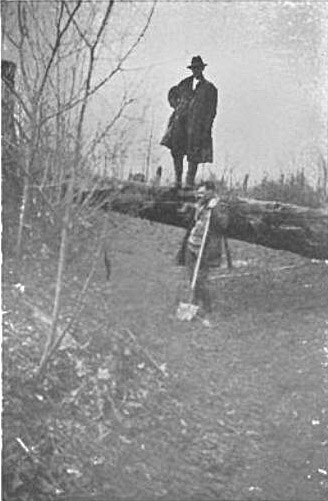Aetna Earthworks facts for kids
Quick facts for kids |
|
|
Aetna Earthworks
|
|

Earthworks c. 1923. Walter Hinsdale standing on tree crossing "moat", Alexander Grant Ruthven standing below
|
|
| Lua error in Module:Location_map at line 420: attempt to index field 'wikibase' (a nil value). | |
| Location | Aetna Township, Missaukee County, Michigan |
|---|---|
| Area | 2 acres |
| NRHP reference No. | 73002157 |
| Added to NRHP | March 30, 1973 |
The Aetna Earthworks are an amazing ancient site in Michigan. They are also known as the Missaukee Earthworks or Missaukee Mounds. This special place has two large circular shapes made from earth. These shapes are called "earthworks."
Scientists think the way these earthworks are laid out tells a story. It might show the "Bear's Journey" tale from the Midewiwin people. This site was added to the National Register of Historic Places in 1973. This means it's an important historical place.
Contents
What Are the Aetna Earthworks?
The Aetna Earthworks are made of two round shapes. Each shape has a ditch and a raised bank. They sit on top of a long, narrow hill called a glacial esker. A glacial esker is a ridge formed by ancient glaciers.
These two circular earthworks are about 650 meters (2,130 feet) apart. They are lined up from east to west.
The Western Earthwork
The earthwork on the west side is about 48 meters (157 feet) across. It is known as 20MA11.
The Eastern Earthwork
The earthwork on the east side is a bit bigger. It measures about 53 meters (174 feet) across. This one is called 20MA12. The eastern earthwork is also taller and wider than the western one.
Each of these earthworks originally had two openings or entrances. One entrance in each earthwork points roughly towards the other earthwork. The other entrance in each faces mostly north-northwest.
Other Features at the Site
Besides the two big circles, the site also has other interesting parts.
- There are two small, cone-shaped burial mounds. One is north of the eastern earthwork. The other is south of the western earthwork.
- You can also find several scattered storage pits. These pits were likely used to store food or other items.
Scientists believe the way everything is arranged at this site is very special. It looks a lot like the path described in the Midewiwin origin story called "Bear's Journey." Because of this, many think the site was used for important ceremonies. These rituals were probably connected to the story.
History of the Aetna Earthworks
The Aetna Earthworks were built a long, long time ago. Experts believe they were made around 1200 AD. This was about 800 years ago!
Early Studies and Excavations
The land where the Aetna Earthworks are located was given to the University of Michigan in 1922. This allowed scientists to study the site.
- In 1925 and 1926, staff from the University Museum did some digging. This is called an excavation. They carefully uncovered parts of the site.
- Later, in 1965, researchers from Michigan State University also carried out excavations.
- More recently, in the 2000s, further studies and digs were done. These excavations help us learn more about the people who built these amazing earthworks.

